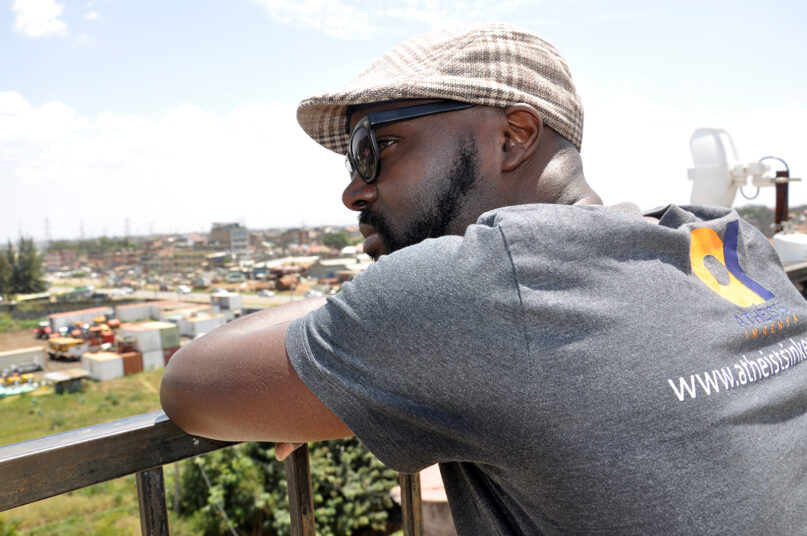NAIROBI, Kenya (RNS) — A small atheist organization in Kenya is gaining ground in this largely Christian nation as it tackles political ideologies and human rights matters, wading into debates outside its usual critiques of religion.
While the group has kept up its calls for reforms of church regulation and religious education, it has also gotten attention for plans to distribute personal hygiene supplies in Kenya’s slums and for supporting a needy schoolboy — the kind of charity that is mostly the province of church groups here.
“We are trying to make Kenyans see that we are not a weird group,” Harrison Mumia, president of Atheists in Kenya Society, told Religion News Service. “We want to show that we can sympathize with situations and also offer interventions.”
The group flashed some of its newfound muscle in late January, after Ida Odinga, the wife of former Prime Minister Raila Odinga, had retreated from her criticism of what she said was slipshod training for Christian clergy in the East African country and of illegal churches run by poorly schooled clerics.
RELATED: Ex-Muslims in India find solidarity online as they face social and familial rejection
“I sincerely apologize for the discomforts caused as I meant no harm to anyone,” said Odinga on Jan. 28, just a day after her critical comments. “I reiterate that training only makes the service of preaching better and promotes the ministration of the Word of God.”
The Atheists in Kenya Society took up Odinga’s call for reform, arguing that the church in Kenya has been commercialized and that legislation is needed to guarantee transparency and accountability in religious institutions.
“The government should shut down churches that fall short of the threshold to operate,” said Mumia.
But with elections coming in August, the group has begun reaching out to political parties to sign a declaration that they would not discriminate against anybody on the basis of their religion, or lack of one.
“When you look at our politics,” said Mumia, “there is always assertion that God is with us. We even have the aspect that the president is chosen by God. We are asking leaders of political parties to affirm to Kenyans that they will not go to campaigns talking about God.”
Their campaign is directed not only at freedoms for atheists, but at what they say is a greater good. “The political leadership has to change and we think atheists in Kenya will drive that transformation. The transformation will lead to a more equal society, where nobody is discriminated against on the basis of religion or lack of religion,” Mumia said.
In a country where 85% of the 50 million citizens are Christian, about 755,000 are atheists, according to Kenya’s 2019 Population Census Report. Atheist leaders say their polling shows the number closer to 1.5 million. “We are receiving many new members and we are engaging with them,” Mumia said in an interview. “Kenya is changing. This should be the next earthquake.”
Religious leaders have long resisted the atheist society’s attempts to be registered with the government as an official faith group. After sustained pressure the government issued the group a registration certificate in 2016, three years after it was founded at a meeting in Nairobi in 2013.
Loreen Maseno, a senior lecturer at Maseno University, said atheists are becoming more visible in Kenya, and the reasons for their growth are complicated. Kenya has witnessed a population boom in recent years, and all faith groups have increased. But she said young Kenyans especially now access much more information about alternatives to traditional religions on the internet, giving atheism a higher profile.
Mike O’Maera, a former editor of the Catholic Information Service for Africa, agreed that technology has spread atheist ideas but said increasing affluence and flawed religious leaders have also contributed. “Some influential church leaders here have flouted morality, thus left followers disgruntled,” O’Maera said. “That’s why atheism is becoming an alternative for some of the Christians.”
The atheist society’s philanthropy has also added to its prominence, drawing both praise and criticism.
In 2020, a Twitter post alerted the group to the plight of a boy in Baringo County in the Rift Valley region, Abel Lutta, who had attained top grades in his school examinations but whose single mother, a vegetable seller, could not afford the required fees to send him on to high school.
After seeing the Twitter post, said Mumia, “We took it up as a society and raised the full fees.
“We wanted to demonstrate an atheist is human and feels for the underprivileged. There is a view that when we don’t believe in God, we don’t care about other people. We are human beings,” said Mumia.
Ironically, Mumia recalled, “The mother called to tell me that she thanks God for our action. It didn’t surprise me. We knew she is a religious person. We were not helping because of her religious background.”
But the group’s donations triggered reactions from Christian clergy and some ordinary Kenyans, who urged Lutta’s mother to reject what they viewed as devil’s money.
RELATED: In Catholic Italy, ‘de-baptism’ is gaining popularity
Some clerics view atheism like any other belief the Christianity missionaries encountered when they arrived in Africa. “Christianity did not find a vacuum. There has been traditional religion, there have been people of different beliefs and we have coexisted,” said the Rev. Joseph Njakai, an Anglican priest from central Kenya.
The priest, while pointing out that Christian churches support children as well, accused the atheists of capitalizing on poverty. He credited their generosity, meanwhile, to a God-given empathy.
“I think they want to gain mileage (publicity) using the vulnerable. I don’t think this is all about being human. They may say they don’t believe in God, but the element of God in them is what makes them be good,” said Njakai.





